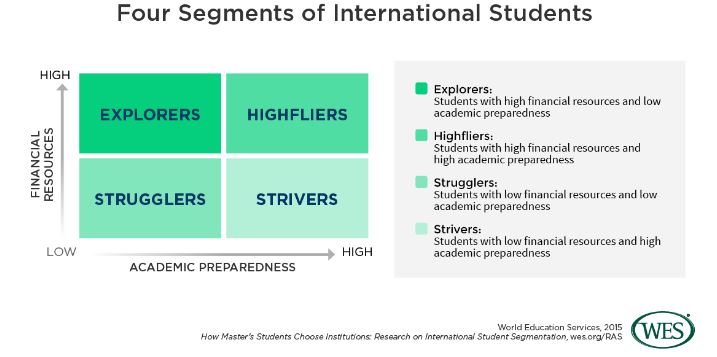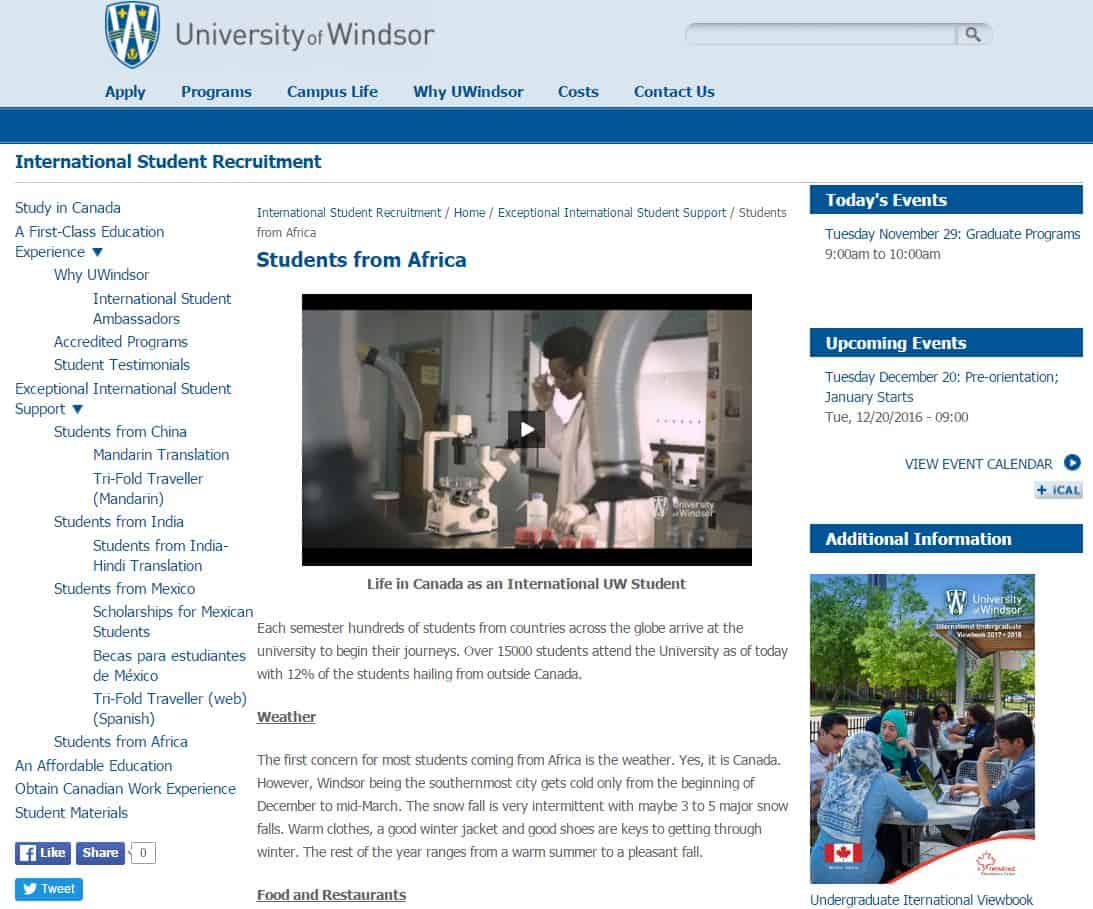International Student Recruitment Opportunities in Africa
As International Student Recruitment becomes increasingly competitive, more and more institutions are looking beyond the most obvious source countries in Asia to emerging markets around the world.
Among the most intriguing of these prospective markets is Africa, the fastest growing economic region in the world after East Asia, whose young population has a huge demand for quality education.
According to UNESCO statistics, the number of African students enrolled in tertiary education more than doubled to 12.2 million from 2000 to 2013.
Nigeria is the leading source of African international students and the logical focal point for recruitment efforts but it is far from the only promising market for colleges and universities.
The 2016 U.S. Open Doors Report on International Education Exchange reveals the four highest source countries of African students in the United States during the 2015-16 academic year:
- Nigeria (10,674 students)
- Ghana (3,049)
- Kenya (3,019)
- South Africa (1,813)
Language has to be considered when choosing regions to target, as the significant French colonial influence in parts of the continent makes France the most popular overall study destination for African students abroad.
By some counts, there are over 3,000 languages spoken in Africa, but 130 million speak English as either a native or secondary language and it’s an official language of at least 23 African countries.
Understanding Africa from a Higher Education Perspective
Africa’s impressive economic momentum in the 21st century has been fueled by its vast oil and mineral reserves. Although the collapse of global commodity prices and repercussions from the Arab Spring have decelerated its growth since 2010, continuing diversification has made it resilient and three powerful trends are likely to sustain it (as detailed in a recent report from the World Economic Forum).
First, the continent has a young population, growing labour force and rising middle class – for example, one-fifth of Nigeria’s 188 million people are between the ages of 15 and 24 and the country’s middle class has grown six-fold in 14 years.
Second, urbanization is a mega-trend profoundly transforming African societies, expanding consumption behaviour and infrastructure investments.
Lagos, Nigeria is one of the world’s most populous cities, needing an educated workforce in areas like business, engineering, medicine and IT to support its sustained economic viability.
The rapid pace of technological change is the third major factor signalling growth potential. Africa is the fastest adopter of smartphones in the world, enabling it to leapfrog infrastructure limitations through instant access to information and mobile banking. An increasingly healthy ecosystem of tech start-ups in several African nations is another source of strong demand for educated talent.
Nigeria’s Unique Appeal for International Student Recruitment
Nigeria is in a league of its own regarding population growth and potential international student recruitment. With a median age of 18, it’s on pace to become one of the world’s most populous countries by century’s end.
Total tertiary enrollment is projected to more than double from 2.3 million in 2013 to 4.8 million in 2024. Despite recent falling oil prices, Nigeria still has the highest GDP and one of the fastest growing economies in the continent.
The British Council recently projected that Nigeria will contribute the strongest average annual growth in post-graduate student mobility through 2024 (+8.3%) of all source markets studied. A closer look at its growing demand for higher education reveals why it is such a great recruitment market.
Education is one of the biggest priorities for Nigeria’s growing middle class as evidenced by the booming primary and secondary private school market, serving 43.6% of children in urban areas, according to 2014 figures cited by ICEF Monitor.
Importantly, more than 1.7 million Nigerians seek admission to a domestic university each year but only about half a million succeed. The number of Nigerian universities has leaped from 51 to 128 from 2005 to 2013 and the National Universities Commission has promised nine new private universities but the government is well aware it can’t cope with increasing demand.
Various reports suggest that the sharp jump in new education institutions has caused quality to suffer, motivating more parents to look outside their borders to prepare their children for expanding opportunities.
The UK has been the most popular study destination, hosting 17,920 Nigerians in 2014/15, but the U.S., Canada and neighboring Ghana have been receiving more students in the last few years at the expense of the UK.
The opportunity of a working permit after three years of studies makes Canada an increasingly popular choice. Many schools participate in events like the recent Education USA Nigeria annual virtual college fair, where officers visit high schools to discuss higher education opportunities in their country and the international study experience.
Concerns about agent fraud and hidden fees have prompted increased certification processes for agents, such as the Nigerian Association of UK Certified Education Agents.
Considerations for Student Recruitment in Nigeria
Institutions looking to recruit in Nigeria should understand its unique linguistic and ethnic diversity (there are four major ethnic groups and hundreds of smaller ones dominant in different areas of the country) and, besides recruitment agents, look to proactively develop relationships with local schools and partners.
Mark Brooks, a consultant working in the region, advises that in-country connections are key: “the schools in Nigeria wish to develop working relationships rather than be seen as a captive recruitment market.”
Focusing initial efforts on solid relationships with a few schools and connections is a worthwhile strategy for gaining a foothold in Nigeria and the wider continent. Working with school leaders to develop exchanges is an effective initiative for mutual benefits.
Among international source markets, Sub-Saharan African countries like Nigeria generally have high academic qualifications, with SAT scores reported to be as high or better than students from other regions.
According to 2015 research from the World Education Services (WES), this region has the largest proportion of “strivers” and also numerous “highfliers”, indicating academic preparedness isn’t a problem. Strategically offering attractive financial aid packages is one way higher education institutions can recruit more of these highly qualified students.
Although the fundamentals of student demand in Nigeria remain strong, schools should be aware that the collapse in world oil prices has significantly devalued the country’s currency and placed the stability of its extensive scholarship systems in doubt.
Earlier this year, the Nigerian government announced that its Central Bank would no longer allow foreign exchange transactions for study abroad payments.
Many current students abroad have been experiencing delays in their scholarship payments, effectively ‘stranding’ thousands and forcing recipients of at least one funding agency to finish their studies in Nigeria.
Incidentally, state-sponsored Saudi Arabian students abroad are facing a similar predicament. While this substantial drop in purchasing power will unfortunately limit the number of Nigerians able to afford foreign tuition’s, education consultant Felix Adedayo believes that the motivation to study abroad will only increase because Nigerian-based multinational companies prefer foreign degree holders.
“They have a better chance in Nigeria than anywhere else because they are appropriately positioned to get good jobs in Nigeria than their counterparts who studied locally when they come back home,” Adedayo said.
The aforementioned WES research indeed suggests career prospects are the biggest motivator for Sub-Saharan students choosing schools abroad, including the institution’s reputation among employers and its career preparation services.
Cost is more likely to be a factor here than for students from other regions. While survey responses indicated location was the least important attribute, the top five U.S. institutions currently receiving Nigerians are interestingly all in the state of Texas.
Leveraging Students and Alumni for African Student Recruitment
Besides establishing local connections in the region, there are opportunities for colleges and universities to expand their student recruitment in Africa by leveraging alumni relationships and digital marketing initiatives.
Helping to create welcoming communities for your current students, faculty and alumni from Africa is a great place to start building a bridge for future enrollment. Word of mouth is a powerful influencer, particularly in this age of social media saturation, and prospective international students will want to know about the experiences of previous students from their country.
How do you create a successful student and alumni ambassador program? Look around your campus and social media marketing channels for particularly active and passionate students that champion your school, including those who already lead campus tours and orientation and those naturally drawn to answer questions on your online portals.
Establish clear goals and guidelines for their participation so they know what to expect. Most student ambassadors are unpaid but may receive free admission to events and other perks along with professional development, networking and promotion opportunities.
Alumni can be your most authentic and convincing ambassadors for prospective students and their parents, sharing their extensive knowledge and unique experiences of campus and post-graduate life.
Selected alumni could be enlisted to make presentations, participate in campus tours or off-campus fairs, interview prospective students, contribute to blogs or social media, and record video interviews for your website and YouTube channel. Alumni mentors can provide support, integration and career advice, and stories about their personal experiences.
Develop effective collaboration between your international recruitment staff and your alumni office to establish a sustainable outreach program.
Schools like the University of York recruit international ambassadors during their last term of study who are known to be based in underrepresented areas, promoting their alma mater’s reputation by delivering independent talks at schools and colleges, and meeting face-to-face with prospective students and their parents.
Quantifiable outcomes, such as changes in applications or conversion rates, can help evaluate the success of these initiatives.
Digital Marketing Initiatives for International Student Recruitment in Africa
A 2014 survey of students online by TopUniversities.com found that students in Africa and Latin America are more than twice as likely as those in North America and Europe to view social media as essential to higher education research.
Students in countries like Nigeria, Kenya, Ghana, South Africa and Senegal are very active on networks like Facebook and Twitter, where they can learn more about the sociable side of your school, including their unique segment of interest.
Example: African students can learn more about a school’s diversity through Facebook groups like this one at Concordia University. Although they run independently from university administration, social media monitoring with a tool like Hootsuite can keep staff informed about potential reputation management issues.
Posting occasional testimonials by African students and demonstrations of their involvement on campus, such as clubs or awards, can enhance your school’s image for both current and future students. Recognize that nearly all of your prospects will be accessing your website with a smartphone, so ensure that your financial support opportunities and student visa information is easily accessible.
Example: The University of Windsor has dedicated landing pages for key international recruitment markets, including Africa. These include a general video and view-book for international students as well as specific information deemed important for these prospects, including the weather in Canada, housing, transportation, student groups and services, and local African restaurants and shops.
While a lack of financial resources may limit widespread student mobility from African countries relative to other regions, the continent’s growing population, economy and hunger for quality education make it a promising recruitment market for colleges and universities. It can be a challenging territory for admissions teams to navigate but many schools are finding the investment to be worthwhile.
“There are a lot of talented students there,” says Calvin Smith, Webster University’s director of international recruitment and services. The St. Louis-based institution, which has branch campuses throughout the world, opened a new campus in Accra, Ghana in 2013. “They’re very much looking for a U.S.-style education, but they do not have the funding to come to the United States.”
Investigating your analytics data can help you better understand how students from these countries are interacting with your school online, providing insights into which specific region may deliver the best ROI and which programs of study are most popular. Optimizing your web resources and developing targeted digital marketing techniques are comparatively simple ways of accessing this burgeoning market with a low cost and high potential impact.
Content Source :- https://www.higher-education-marketing.com
Topic :- International Student Recruitment Services


